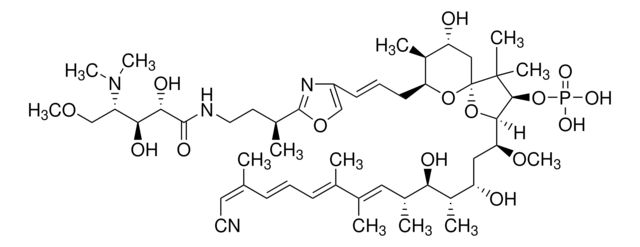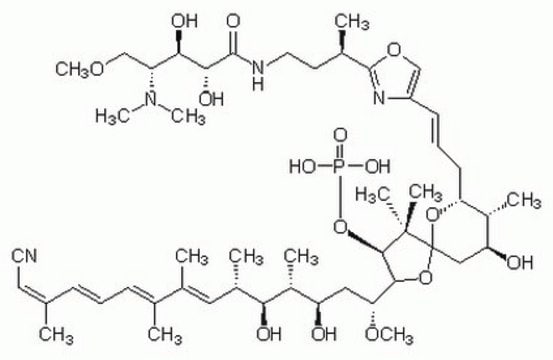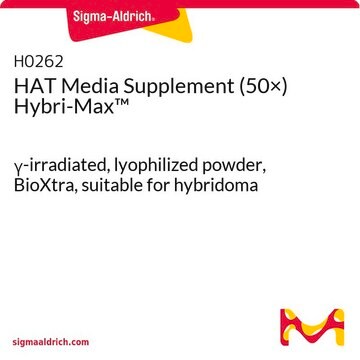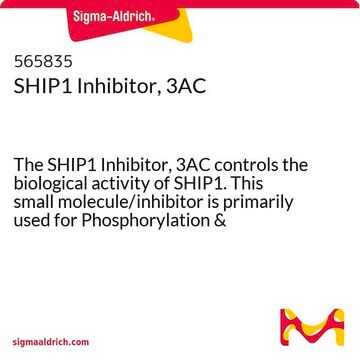580551
Tautomycin, Streptomyces spiroverticillatus
Tautomycin, CAS 109946-35-2, is a potent inhibitor of protein phosphatase 1, 2A, and smooth muscle endogenous phosphatase (IC₅₀ = 1 nM, 10 nM, and 6 nM, respectively). Mixture of two isomers.
Synonyme(s) :
Tautomycin, Streptomyces spiroverticillatus
About This Item
Produits recommandés
Niveau de qualité
Pureté
≥97% (HPLC)
Forme
lyophilized (thin film)
Fabricant/nom de marque
Calbiochem®
Conditions de stockage
OK to freeze
desiccated
protect from light
Solubilité
chloroform: soluble
ethanol: soluble
methanol: soluble
Conditions d'expédition
ambient
Température de stockage
−20°C
InChI
1S/C41H66O13/c1-21(2)36(51-34(47)20-31(45)35-27(8)39(48)52-40(35)49)38(50-10)32(46)19-30(44)26(7)29(43)13-11-24(5)37-25(6)16-18-41(54-37)17-15-23(4)33(53-41)14-12-22(3)28(9)42/h21-26,29,31-33,36-38,43,45-46H,11-20H2,1-10H3/t22-,23+,24+,25-,26-,29-,31+,32+,33-,36+,37-,38+,41+/m0/s1
Clé InChI
RFCWHQNNCOJYTR-IRCAEPKSSA-N
Description générale
Actions biochimiques/physiologiques
PP1
Avertissement
Reconstitution
From Catalog:
Desc. Field- removed ". . .and useful for studies involving protein phosphorylation"
- removed ". . .or phorbol dibutyrate binding. Does not activate protein kinase C or inhibit myosin light chain kinase"
Autres remarques
Mitsuhashi, S., et al. 2001. Biochem. Biophys. Res. Commun.287, 328.
Kikuchi, K., et al. 1999. Int. J. Mol. Med.4, 395.
Sheppeck, J.E., et al. 1997. J. Org. Chem.62, 387.
Sugiyama, Y., et al. 1996. Bioorg. Med. Chem. Lett.6, 3.
Gong, M.C., et al. 1992. J. Biol. Chem.267, 14662.
Suganuma, M., et al. 1992. Toxicon30, 873.
MacKintosh, C. and Klumpp, S. 1990. FEBS Lett.277, 137.
Magae, J., et al. 1989. J. Antibiot.42, 1290.
Informations légales
Mention d'avertissement
Danger
Mentions de danger
Conseils de prudence
Classification des risques
Acute Tox. 2 Oral
Code de la classe de stockage
6.1A - Combustible acute toxic Cat. 1 and 2 / very toxic hazardous materials
Classe de danger pour l'eau (WGK)
WGK 3
Point d'éclair (°F)
Not applicable
Point d'éclair (°C)
Not applicable
Certificats d'analyse (COA)
Recherchez un Certificats d'analyse (COA) en saisissant le numéro de lot du produit. Les numéros de lot figurent sur l'étiquette du produit après les mots "Lot" ou "Batch".
Déjà en possession de ce produit ?
Retrouvez la documentation relative aux produits que vous avez récemment achetés dans la Bibliothèque de documents.
Notre équipe de scientifiques dispose d'une expérience dans tous les secteurs de la recherche, notamment en sciences de la vie, science des matériaux, synthèse chimique, chromatographie, analyse et dans de nombreux autres domaines..
Contacter notre Service technique









